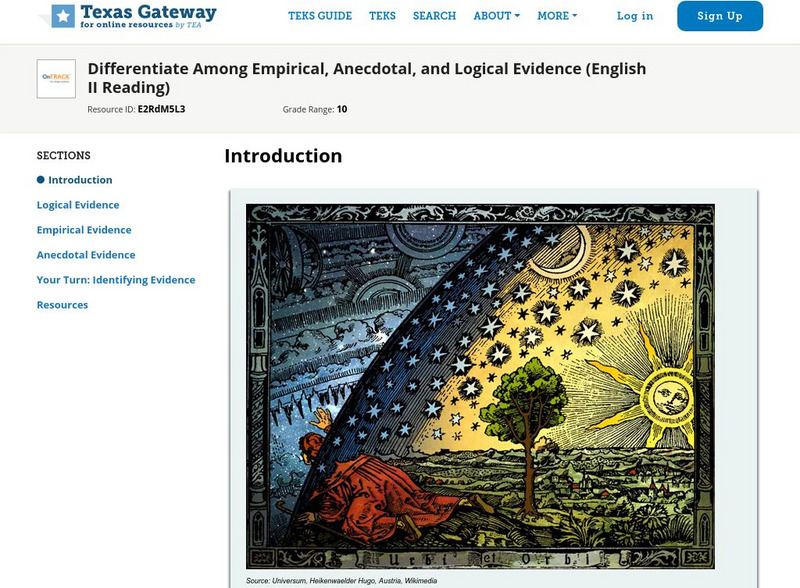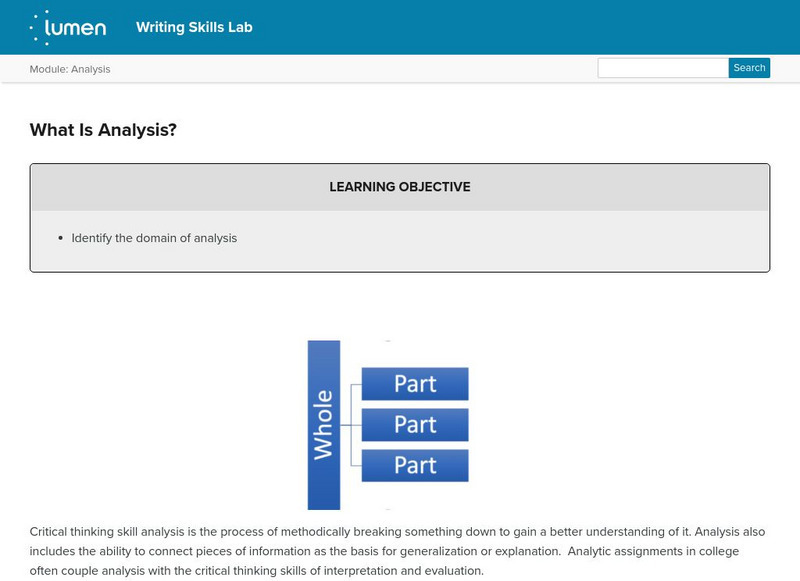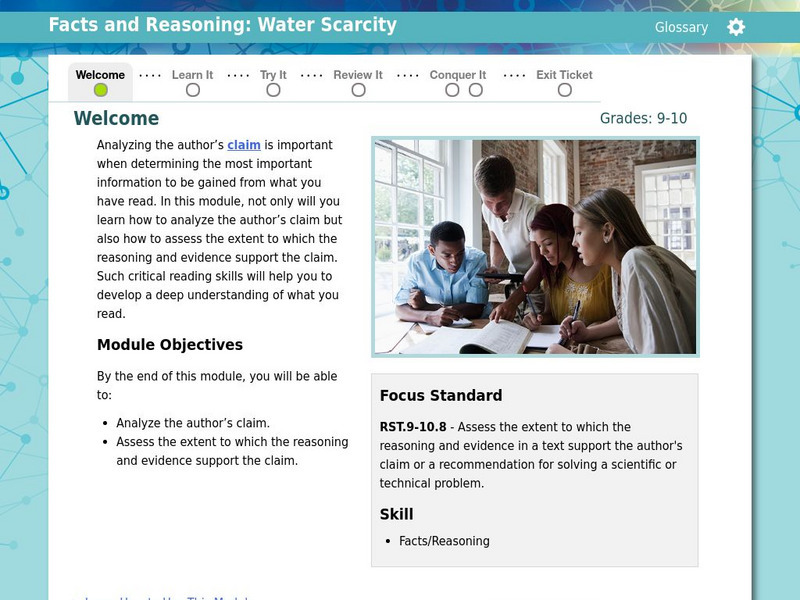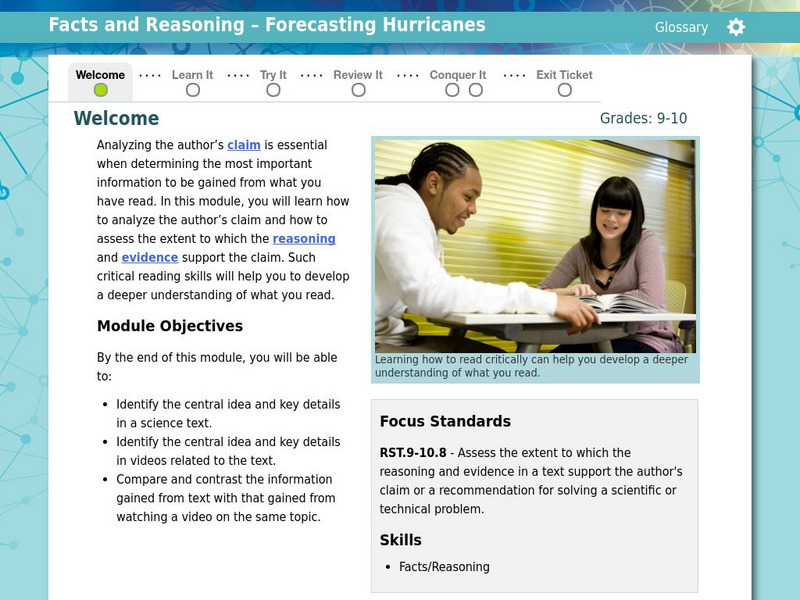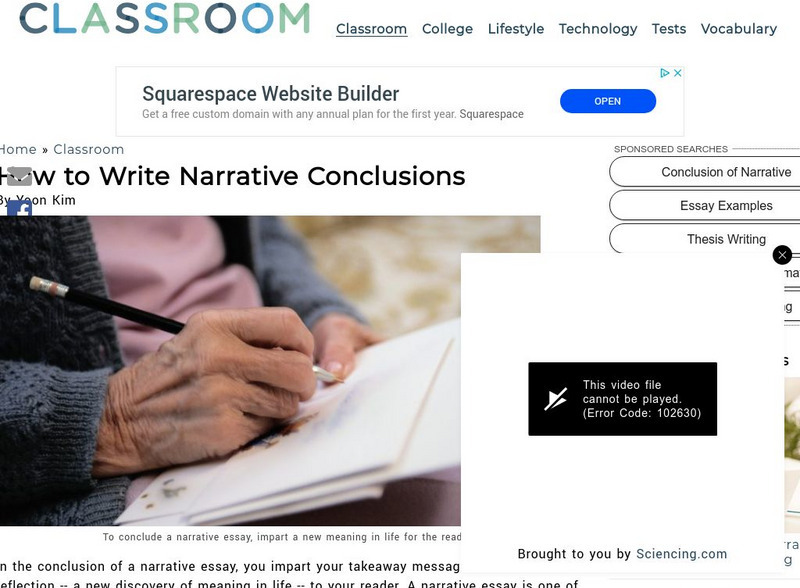Texas Education Agency
Texas Gateway: Differentiate Among Empirical, Anecdotal, and Logical Evidence
[Accessible by TX Educators. Free Registration/Login Required] Distinguish among different kinds of evidence in a text that supports conclusions and arguments in texts.
Texas Education Agency
Texas Gateway: Analyze an Argument: Practice 1 (English Ii Reading)
Analyze the quality, relevance, and credibility of evidence that supports or opposes an argument.
Lumen Learning
Lumen: Analysis: What Is Analysis?
This lesson plan focuses on analysis including defining analysis and listing the essential skills of analysis.
Lumen Learning
Lumen: Critical Reading: Logic and Structure
This lesson focuses on structure and logic including types and purposes of essays, organizational patterns, argumentative writing, and logic and fallacies.
University of Victoria (Canada)
Uvcs: Critical Reading Exercise
Students read quotations from different "interest groups" or "lobbies" in this exercise and then perform a multiple-choice test to evaluate the credibility of each lobby group.
Thinkport Education
Thinkport: Analyzing Data Sources and Author's Purpose: Electric Currents
In this science-themed literacy lesson, students learn how to determine the author's purpose and follow the development of that purpose.
Texas Education Agency
Texas Gateway: Informational Text: Analyze an Argument: Practice 1
When you read an argumentative essay or article, you should analyze the author's evidence. However, you can't analyze the evidence a writer gives in support of a position if you don't know the author's perspective.
Thinkport Education
Thinkport: Facts and Reasoning: Water Scarcity
In this science-themed literacy lesson about water scarcity, students identify the author's claim and how the author supports this claim with evidence.
Thinkport Education
Thinkport: Facts and Reasoning: Forecasting Hurricanes
In this science-themed literacy lesson about forecasting hurricanes, students identify the author's claim and how the author supports the claim with evidence and reasoning.
Other
Learning Design Collaborative: Cer: Claim, Evidence, and Reasoning
Students write a scientific claim that is backed up by evidence and supported by scientific reasoning. Base your answer on your reading of a data table.
Leaf Group
Classroom: How to Write Narrative Conclusions
This article focuses on how to write conclusions for narratives by sharing a takeaway message, a lesson or a reflection -- a new discovery of meaning in life -- for your reader. W.9-10.3e Conclusion, W.11-12.3e Narrative Conclusion
University of North Carolina
University of North Carolina: The Writing Center: Scientific Reports
A handout exploring how to complete a scientific report based on scientific research. The site describes the sections needed as well as how to insert graphs and tables.
Texas Education Agency
Texas Gateway: Analysis of Relative Values of Specific Data, Facts, and Ideas
[Accessible by TX Educators. Free Registration/Login Required] In this lesson we will talk about reviewing the facts and data you use to support your arguments and assessing the reliability of the sources you use.
Texas Education Agency
Texas Gateway: Analysis of Relative Values of Specific Data, Facts, and Ideas
[Accessible by TX Educators. Free Registration/Login Required] In this lesson, you're going to begin to think about how to analyze the data, facts, and ideas that you need to support your argument, the final step in planning your...
Other
Csicop: Field Guide to Critical Thinking
This article, originally published in Skeptical Inquirer, outlines some of the key components of the scientific problem-solving process while addressing the many reasons for the popularity of paranormal beliefs in the U.S. (Published in...
Khan Academy
Khan Academy: Identify the Technique Learn More
"Identify the technique" questions will ask you to describe the reasoning of an argument - the way it uses support to justify a conclusion. These questions focus on structure, method, and technique. They're not concerned with what the...
Khan Academy
Khan Academy: Types of Conclusions
You might find it helpful to categorize the kind of conclusion you're dealing with as you approach passages that contain arguments on the LSAT. Your success in analyzing arguments-passages with a conclusion and supporting evidence-starts...
Khan Academy
Khan Academy: Organizing Information Quick Guide
Organizing information questions ask you to understand and analyze how a passage works to make an argument. What is the progression of ideas in the passage? or What is the purpose of a specific paragraph?
Khan Academy
Khan Academy: What Separates Science From Art?
Practice critical analysis and reasoning skills with this reading excerpt from the MCAT.
Khan Academy
Khan Academy: Identify the Conclusion Quick Guide
The resource from Khan Academy provides practice questions for the LSAT. This section provides quick guide on "how to identify a conclusion in a line of reasoning" in the "Logical Reasoning" section.
Khan Academy
Khan Academy: Identify the Conclusion Learn More
The resource from Khan Academy provides practice questions for the LSAT. This section provides quick guide on "how to identify the main conclusion of an argument" in the "Logical Reasoning" section.
Khan Academy
Khan Academy: Identify the Conclusion Examples
The resource from Khan Academy provides practice questions for the LSAT. This section provides examples of the "Main Conclusion" question type of the "Logical Reasoning" section.
McGraw Hill
Read: Does Technology Make Us Lazy?
Compare these two passages for some interesting ideas about how technology affects our lives. The questions that follow ask you to identify the main idea from either direct statement or inference.
Other
Teaching Critical Thinking Skills
It is increasingly important to teach students how to develop their critical thinking abilities. This site lists some ideas and strategies that can help teach them to improve their critical thinking skills.


